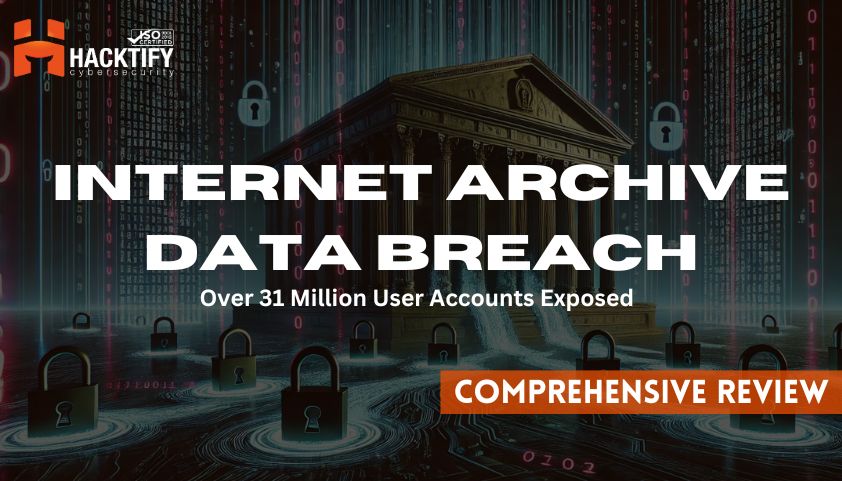Internet Archive Data Breach: Over 31 Million User Accounts Exposed
The Internet Archive, a nonprofit organization known for its massive digital library and the Wayback Machine, faced a significant cybersecurity breach in October 2024. The breach exposed the personal information of more than 31 million user accounts, marking one of the largest data breaches affecting a nonprofit entity. The attack not only compromised user credentials but also highlighted vulnerabilities within organizations that provide valuable public services without the extensive resources of large corporations.
Overview of the Breach
The breach was first identified in late September 2024 when cybersecurity expert Troy Hunt, founder of the “Have I Been Pwned” service, was notified about the leak of a 6.4 GB SQL file containing account data from the Internet Archive. The exposed records included usernames, email addresses, and bcrypt-hashed passwords. By early October, Hunt had verified the authenticity of the breach and began notifying affected users through his platform. Interestingly, a substantial portion of the email addresses in the stolen data had already appeared in previous breaches, showing that many users might have reused their login credentials across different services.
The breach occurred at a time when the Internet Archive was already grappling with other challenges, including legal battles over its digital lending practices. These pressures have placed the Archive under increased scrutiny, making it a potential target for cyberattacks(
Methodology of the Attack
Hackers exploited a vulnerability in a JavaScript library used by the Internet Archive to execute the attack. This vulnerability allowed them to inject malicious code into the website, which resulted in the defacement of the Internet Archive’s pages. Visitors to the site saw an ominous message indicating that their data had been compromised. The same attackers also launched a distributed denial-of-service (DDoS) attack, making the website intermittently inaccessible over several days.
The attackers identified themselves as a hacktivist group called BlackMeta, though it remains unclear whether the data breach and the DDoS attacks were coordinated or occurred independently. The group’s motivations, as per some reports, appeared to be linked to the Archive’s legal troubles, particularly its copyright disputes
The Organization’s Response
The Internet Archive responded quickly after being notified of the breach. The organization disabled the compromised JavaScript library and conducted a comprehensive review of its systems. Founder Brewster Kahle confirmed the breach and outlined the steps taken to mitigate the damage, which included upgrading security protocols and scrubbing compromised systems
However, even after these efforts, the Archive continued to face DDoS attacks, further delaying the full restoration of its services. While the Internet Archive’s response was swift, some critics argued that the organization should have disclosed the breach earlier, considering the potential risks to its user base. Others, however, noted that the Archive, being a nonprofit, lacked the extensive cybersecurity resources of larger tech companies, making it more vulnerable to sophisticated cyberattacks.
Impact on Users
With over 31 million accounts exposed, the breach has raised significant concerns about user privacy and the potential for further attacks. Although the passwords were hashed using bcrypt, a strong encryption method, users have been advised to change their passwords, particularly if they have reused the same password on other platforms. This breach also increases the risk of phishing attacks, where hackers could use the compromised email addresses to deceive users into revealing more personal information.
Affected users are recommended to:
- Change their Internet Archive passwords immediately.
- Enable multi-factor authentication (MFA) on their accounts, where possible, for added security.
- Remain vigilant against phishing emails and suspicious activities.
Lessons Learned and Broader Implications
The Internet Archive breach serves as a reminder that even organizations with noble missions, like preserving digital history, are not immune to the rising tide of cyber threats. The incident highlights the importance of regular security audits, continuous updates to systems, and employing third-party security assessments to identify and patch vulnerabilities.
Nonprofits often struggle with budgetary constraints that can limit their investment in robust cybersecurity infrastructure. This leaves them susceptible to breaches, which can undermine the public’s trust and potentially harm the very communities they aim to serve. Cybersecurity experts recommend that nonprofits take a proactive approach by building stronger defense mechanisms, educating their users about online threats, and preparing for quick responses in case of breaches.
For the broader community, this breach raises awareness of the vulnerabilities of smaller, resource-limited organizations. As cyberattacks continue to evolve, it is vital for all entities—both nonprofit and for-profit—to adopt stringent cybersecurity practices to protect their data and maintain trust with their users.
Conclusion
The Internet Archive data breach is a stark example of how even well-intentioned organizations can be exposed to significant cyber risks. For the millions of users affected, the immediate concern is securing their accounts and avoiding phishing attempts. For the Archive itself, this breach serves as a wake-up call to strengthen its cybersecurity framework while continuing its mission to preserve the digital record of human history.



